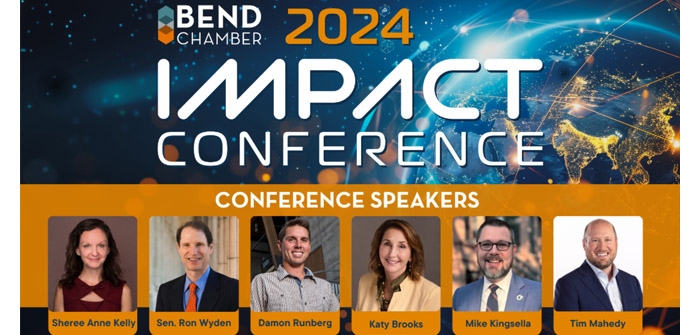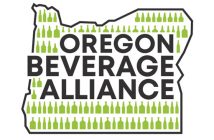(Graphic courtesy of Bend Chamber)
Bend’s Business World & a Message from Ron Wyden
The 2024 Impact Conference, held in the beautiful Riverhouse Lodge, promised to be a 360-view of the important issues, challenges, and opportunities on the horizon for businesses right now and into the future. That promise was kept with informative and insightful speakers, one after another for a day of education, collaboration and celebration.
After a complimentary breakfast buffet, Bend Chamber President and CEO Katy Brooks kicked off the day, and introduced U.S. Senator Ron Wyden for a special message. Senator Wyden called in via video call and took questions from Katy, where he shared his insights into upcoming legislation that would affect the world of business in some way.
First, Wyden emphasized the importance of advocating for housing and childcare. He said that he will be pushing “aggressively” for housing-focused legislation. In addition, he is looking for approaches that address housing issues, including both low-income and middle-income housing tax credits.
Next, Wyden addressed workforce issues, stating that the problem was especially bad in healthcare, saying that, “we need more people to get trained and get into the workforce, but we also need training that addresses new technological advancements, such as AI.
This was his next topic, and a big topic throughout the day. The question of “what is AI and how will it affect my business?” seemed to be a major one on the minds of the speakers, and most attendees. This is likely due to the recent (and very rapid) advancement of AI into the world of business software, which has introduced older generations that might not keep up with all the new tech advancements, to what might be the most significant tech advancement of a generation.
Wyden recalled that when he first joined the Senate, none of his colleagues could even use a computer. Entering the Senate, Wyden knew that Oregon was all about natural resources, with an economy based heavily in that sector. As time went on, Wyden spoke about his role in helping Oregon diversify, and getting things like the tech industry to grow faster than before.
Speaking more on AI, Wyden mentioned how upcoming legislation could be foundational, in how it affects the way we interact with AI, and how it will evolve, for years to come.
Rounding out his talk, Wyden ended with another sentiment on healthcare, stating, “I’m in public service because of healthcare. If you and your loved ones don’t have your health, everything else goes by the board.”
Wyden ended his statement by sharing the idea that, while we spend more on healthcare than any other country, we are clearly spending it in the wrong places.
After Wyden said his goodbye, Katy Brooks retook the stage to go over some overarching findings from the 2024 Horizon Initiative, which gives insights into the local and national state of business, today, in the future, and navigating in between.
The main topic is the same main topic that has been spoken and written about endlessly for nearly every industry, post-COVID. That would be employment, and the struggle to maintain a workforce in Bend. A number of reasons, from the rising cost of insurance and pay for the employer and the cost of living for the employee, to the professional and workplace standards held by different generations, have all had an effect on whether or not businesses can maintain a trained staff.
The conversation of generational differences became a big one, especially in the next ten years. Brooks mentioned that Baby Boomers are aging out of the workforce, even with the rising retirement age. Many Gen Xers are approaching that mark and will be aging out in the next ten years, meaning that the workforce will primarily be made up of millennials, Gen Z and the newly maturing Gen Alpha, the oldest of which are currently 14.
The conference continued with Keynote Speaker Sheree Anne Kelly, CEO of the Association of Chamber of Commerce Executives. Kelly spoke about what lies ahead for chambers and how they can adapt and evolve when faced with the after-effects of things like a global pandemic, a monumental economic downturn, the changing nature of business and a tumultuous political climate.
In all, the 2024 Impact Conference was a successful convening of the professional world, to address the issues, trends and more that we are all facing.





